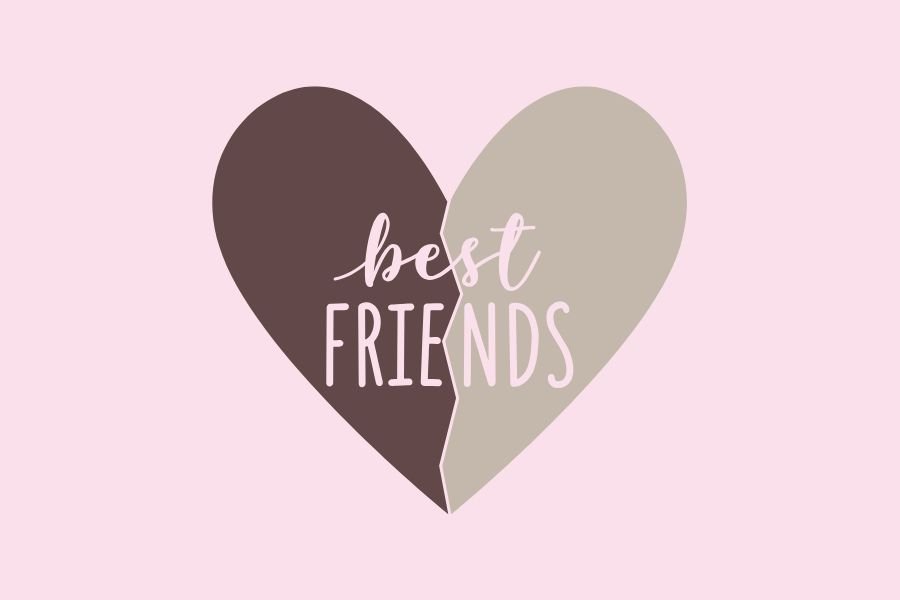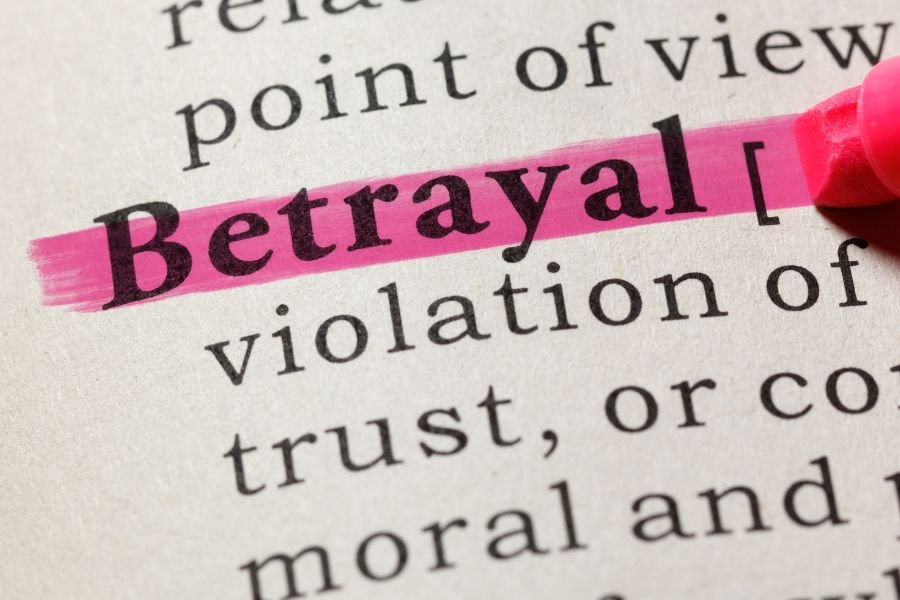FRIENDSHIP BETRAYAL: WHAT IT LOOKS LIKE AND HOW TO COPE WITH IT
Have you ever heard the quote, “Be careful who you trust because salt and sugar look the same?”
Essentially, what it means is that we should be cautious with who we get into relationships with because people are not always who they represent themselves to be.
And unfortunately, that can be true for people we deem to be “friends.”
Sometimes we can be so blinded by friendship that we miss those same people stabbing us right in the back while saying they love us to our faces.
Those intentionally harmful actions are what we like to call acts of betrayal.
Here’s a definition of the word “betray” that I found online: To hurt someone who trusts you (such as a friend or relative), by doing something morally wrong.
While some acts of betrayal are blatantly obvious, others fly under the radar and are equally, if not more, damaging.
This blog post will help you identify what betrayal in a friendship can look like and give you realistic advice on how to cope with it.
8 Types of Betrayal in A Friendship
1| “Friends” who talk negatively about you behind your back
If I went on the hit game show Family Feud and they asked the contestant to name an example of betrayal in a friendship, I’d bet money the number one answer would be a “friend” talking behind another friend’s back.
It’s insane to find out how much your “friend” really doesn’t like you and how common it is for that person to run their mouth to anyone who will listen.
Most Common Scenarios:
Belittling you: When they try to make others believe you’re not as *insert adjective* (i.e. gifted, talented, kind, respectful, generous, smart) as you really are. They want to make who you are and what you do look small.
Joking you: They take jabs at anything about you, the way you walk, the way you talk, the way you dress, etc. to embarrass you.
Making you look bad: They tell other people little quirks or embarrassing stories about you with the hopes that others will view you differently.
This is hurtful and confusing because these “friends” will smile in your face like everything is all good, but secretly try to do damage to your reputation and character.
2| “Friends” who share your private business
With real friends, you allow yourself to open up and be vulnerable about the happenings of your personal life because you feel safe.
So it’s betrayal when you learn that someone breached the confidentiality clause of your friendship and told other people about the things that are most sacred to you.
Those “friends” took advantage of the trust that you had in them and put you in an uncomfortable position.
Listen, this can happen accidentally, we’re not discussing those cases.
We’re talking about the people who intentionally told other people about your *insert secret* (i.e. health issues, relationship challenges, career fears, money problems) with malicious intent.
Their goal was to hit you where they know you hurt the most.
3| “Friends” who allow others to talk badly about you
There is no way a real friend could sit around people who talk about you like a dog and not be offended.
A real friend’s next actions would include some variation of asking them to stop, defending you, checking them, or simply leaving.
So when a “friend” doesn’t do any of those things, but instead stays and allows the gossiping to continue, that’s a form of betrayal.
How could someone be comfortable hanging out with people who make up narratives and lies about their “friends” whom they claim to love?
They can do it because they want to believe the worst about you. They are likely adding their negative thoughts and opinions to the conversation as well (See Betrayal Type #1).
The reality is that, that “friend” doesn’t have your back.
4| “Friends” who lie to you
My definition of a lie is either someone not telling the truth or someone purposely omitting relevant information that could impact your thoughts, actions, or feelings.
Lying breaks trust between friends. It robs the friendship of a sense of security and makes it difficult for you to feel safe with them.
You start to question everything about those friends and you become unsure of their true nature, their actions, and their purpose in your life.
It doesn’t matter if the lie is a “little white lie” or a big one, they both can cause confusion, hurt, and frustration.
One form of lying that is often overlooked but is pretty common is when one friend’s words and actions don’t align.
Something as simple as a friend lying about not liking someone, but then finding out they hung out together. It’s silly and it’s like, what’s the point?
Why lie?
5| “Friends” who spread rumors about you
First and foremost, a person who spreads rumors about you is not your friend.
But sometimes you can be in a friendship with someone and have no idea they do this behind your back.
These fake “friends” could be spreading rumors about you for a number of reasons: jealousy, insecurity, or they simply feel threatened by your existence.
Whatever the reason, it has nothing to do with you and everything to do with how they feel about themselves.
Because of your closeness to them, it makes you an easy target. They can use their knowledge of your life to spread believable rumors.
Other times they lie on you because they know you’re non-confrontational and probably wouldn’t address it.
Or they know you have so much trust in their character that you would never believe said friend would make up lies about you.
In any of these circumstances, it’s all the same, they take advantage of you being a good friend to them, while they are a sucky friend to you.
6| “Friends” who take opportunities away from you
Someone taking an opportunity away from you can be either personal or professional, and it is such a sneaky form of betrayal because it’s almost always done behind your back.
This unfortunate situation can happen in multiple ways, check out the examples below.
Examples:
You’re a wedding planner. Someone around your “friend” mentions they want to use your services, but instead, that “friend” recommends someone else or disrespects your business.
You and your friend are both photographers. You tell her about a new or potential client and she tries to undermine you and get their business first.
A guy likes you and your “friend” knows it, but she likes that guy and tries to get his attention for herself. Or if he asks her to let you know he is interested in you, and she decides not to mention it to you at all.
Some fake friends will even know that you want something, go behind your back and get it first, and then gaslight you into believing you never told them you wanted it.
They might even be audacious enough to call you jealous and make you out to be a bad friend.
Example:
You and your friend work at the same company and you tell her that you want to apply for another position. She never explicitly states her interest in the role, and maybe even expresses disinterest, but then secretly interviews for it and then feigns ignorance of your intentions.
Real friends want to see you win and don’t see you as a threat, but a fake friend can’t stand the thought of you having more than them or the idea of you receiving something that they can’t have.
7| “Friends” who are friends with people who don’t like you (there’s an exception here)
There are a lot of people who feel like you can’t play both sides when it comes to friends who are not friends with each other, and here are two circumstances where I’d have to agree.
The “friend” who intentionally goes out of their way to befriend someone they know doesn’t like you. This is weird and a form of betrayal because why would they want to be connected to someone who has negative feelings toward someone they supposedly love?
The “friend” who witnessed someone intentionally hurt you, but because it was not done to them, they feel as though it’s okay to still be close to said person. It gives off the impression that your “friend” excuses their inappropriate behavior and actions that upset you.
In both cases, it can be uncomfortable because it makes you question the sincerity of the friendship you have with that friend.
HERE’S THE EXCEPTION: Someone who is cool with people who are no longer friends with one another, there were no malicious actions involved, and boundaries are set.
Example:
A, B, and C were friends since elementary school. A and C stopped being close because their values no longer aligned. A and B are still friends and B and C are still friends. Neither person intentionally hurt the other, they simply grew apart, and A and C both respect the other’s friendship with B.
8| “Friends” who do overtly messed up stuff
Betrayal types 1-7 are what I would consider to be subtle offenses, but then there are those grimy, low-down, and dirty offenses that are the ultimate betrayal.
Extreme friendship betrayal examples:
Messing with your significant other before, during, or after your relationship with them. Pursuing your friend’s romantic partner is just wrong and disrespectful.
Stealing from you. It’s already bad enough to take opportunities away from you (See Betrayal Type #6), but to rob you of money or any of your personal belongings is beyond a breach of trust.
Causing you physical harm. Someone putting their hands on you or being the reason you experience physical pain is never okay.
How to Cope With A Friend’s Betrayal
1| Don’t retaliate
When someone hurts you, it may feel natural to want to get revenge but doing so is never to your benefit.
It takes more energy to try and make someone feel as bad as they’ve made you feel and it solves nothing.
If anything, acting out these emotions makes you behave in a way that you wouldn’t be proud of. Don’t allow yourself to become a “hurt people, hurt people” kind of person.
2| Be cautious when addressing the betrayal
At first, I wanted to say not to address it all, but let’s be real. If a friend did us dirty, it would be extremely difficult to act like Elsa and just let it go.
So instead I’ll say to be careful with how you confront someone who has betrayed you.
A person who purposely brought you harm can be dangerous (not trying to be dramatic here), but they could be combative or manipulative and you need to protect yourself and your peace of mind.
If your goal is to get some type of understanding or closure, know that you may never get an honest answer from that “friend.” Or even if you do get one, it doesn’t take away the pain that they’ve caused you.
An apology doesn’t erase wounds, and it does little for your healing journey.
We often want to know whether or not a person we love is remorseful about hurting us, but if we can’t trust their actions, we most certainly can’t trust their words.
3| Go to therapy
While addressing your hurt with the person who betrayed you may not be ideal, that doesn’t mean you shouldn’t address it all.
That’s where therapy comes into play. Some people feel like talking to a therapist about friendship hurt is unnecessary, but that’s simply not true.
Friendships make significant impacts on our lives; and a friend’s betrayal has the power to influence how we trust, how we love, and how we open up to new people.
When a friend violates you, it can make you question yourself, your judgment, and your ability to discern the right kind of people to keep in your life.
Talking to a therapist will help you navigate your hurt, fears, and anxieties while empathizing and respecting the fact that you feel them.
4| Turn to your faith
If you are a woman of faith, there are many avenues of healing available to you.
You can watch sermons online, listen to faith podcasts, read scriptures, and listen to gospel/Christian music.
And don’t forget that you can ALWAYS talk to God.
Talking to Him is incredibly therapeutic and an opportunity to grow closer to Him. Talk to Him as though you were talking to a therapist or a trusted friend.
Allow yourself to release and cast your cares upon Him. God is not afraid of your big feelings and is the ultimate friend and confidant.
5| Journal it out
If you don’t want to talk to anybody, you still need a way to release your pain because bottling it up will do damage from the inside.
You will develop unhealthy traits by trying to move on as if nothing has happened.
So journal it.
And before you say you have bad handwriting, know that today you can journal by typing, by voice recording, or even by creating private videos.
Whatever method you choose, journaling is a great outlet for your emotions.
Afterward, you can examine what you released to gain greater insight and awareness about your feelings.
6| Mourn the friendship
Hey, guess what? It's perfectly normal to mourn a relationship you had with someone you loved, like a friend.
For people that we care about, it’s easy to overlook red flags or miss the cracks in the foundation of our friendships.
And even though they did you wrong, there was once a point in time when they brought joy into your life that caused you to be friends in the first place.
It's okay to miss the person you believed them to be.
It's okay to feel sadness about them no longer being in your life.
It’s okay to be disappointed in their actions and still wish they’d never done it because you loved the friendship so much.
Your feelings are valid. You don’t have to play tough and act like it doesn’t hurt.
7| Learn from the betrayal
There is a lesson in everything, and betrayal can teach us to sharpen our discernment and help us to become wiser in our friendships.
By no means should you shut off your heart to new friends, because you could be missing out on the very people God intends to use to bless you and your life.
Use the betrayal to assess your blind spots and identify areas where you may need to be more reserved with people until you feel totally safe.
Every person in your life serves a purpose, even those friends who betray you. Don’t allow this unfortunate experience to take from you without giving you something back.
Have you ever been betrayed in a friendship? How did you heal from it? Feel free to share in the comments.












